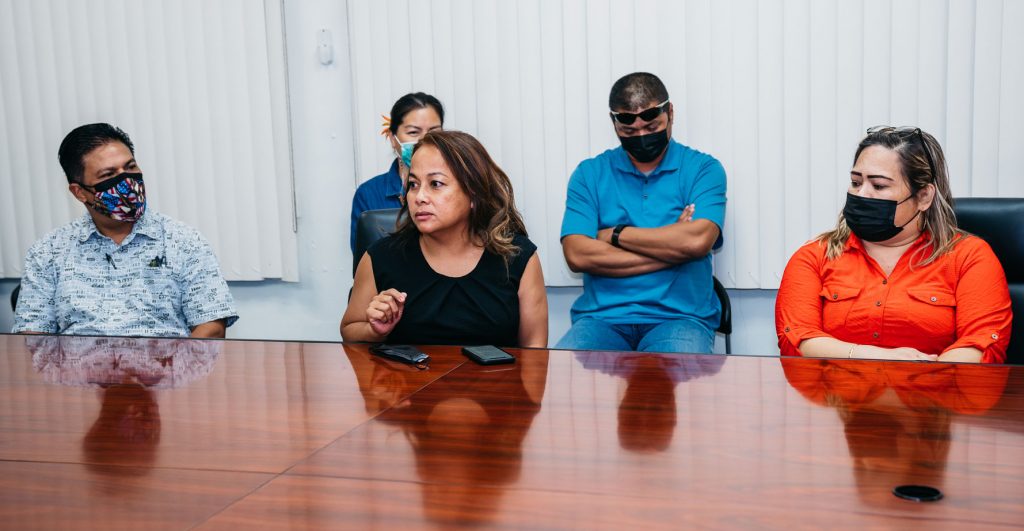New law lifts time limit on civil claims for child sex abuse

Grace “Pitu” Sablan Vaiagae, a counselor and advocate for the rights of abused women, speaks yesterday about the importance of victims to speak up, during the signing into law a bill that authorizes civil claims for child sexual abuse to be commenced at any time. (FERDIE DE LA TORRE)
Gov. Ralph DLG Torres signed into law yesterday a bill that now authorizes the filing of civil claims for child sexual abuse at any time.
In signing the bill into law, Torres said this gives affected children the opportunity to return and file grievances against the perpetrators who have wronged them.
To the sexually abused children, Torres said, this is a life-changing event and they will never be the same again. The governor said this will be an incentive for the victims to step forward and be an advocate so these kinds of action against children are never tolerated.
“And to all the perpetrators, stop. We’re here to protect our children not hurt them, whether they are male or female,” he said.
House Bill 22-2, SD1, introduced by Rep. Joseph Lee Pan Guerrero (R-Saipan), is now Public Law 21-12.
The signing of the bill into law came a day after Grace “Pitu” Sablan Vaiagae, who is a counselor for abused women, filed an ethics complaint against Rep. Edwin K. Propst (D-Saipan) over allegations that he had sex with several underaged women approximately 20 years ago when he was still a teacher at Marianas High School and an employee at Northern Marianas College.
Vaiagae attended yesterday’s signing of the bill, which was held in the Office of the Governor’s conference room. She spoke about sexual assault/abuse, and read at least two emotional statements by two alleged sexually abused victims.
In a later interview, Vaiagae said this has nothing to do with politics and that it’s not about Propst.
“This is about legislation. This is about the law. And this is about women being heard,” she said, adding that, as a counselor for abused women, she is here for the victims who can relate to the trauma.
Propst, who was one of the many co-authors of the bill, was not present at the signing ceremony. The bill’s main author, Guerrero, was also not present but, in a later text message, said that, as a former chief of parole and member of the Criminal Justice System, he had attended numerous trainings that involved sexual abuse of minors by adults perpetrators who were either convicted or slipped through the judicial cracks without prosecution.
Guerrero said this bill addresses the statute of limitation to include filing civil lawsuit against all defendants who took advantage of defenseless individuals just for the perpetrators’ gratification.
He highly encouraged victims of sexual assault to speak out.
“There is no shame at all to hold accountable the perpetrators for the pain, scare, depression, and expenses for victims who, for years, found it difficult to let go and move on with their lives,” he said.
Guerrero said he is hoping that the Attorney General will look into cases that are dormant and/or need to be revisited in the best interest of the victims and victims that are scared to press charges against members in the community—be it family, neighbors, friends, or other persons.
“Who knows, maybe the two sisters that are still missing all these years could be victims of such case,” said Guerrero, referring to the disappearance of sisters Maleina and Faloma Luhk in As Teo on May 25, 2011.
“I hope and pray that we can all make a difference in our community to protect defenseless individuals from being sexually assaulted by despicable individuals,” he said.
Guerrero stated in the bill that criminal prosecution is not barred by a statute of limitation and prosecution may be pursued at any time for a case in which an adult discovers that he or she was a victim of sexual abuse as a child under the age of 18.
He said that criminal prosecution option remains open regardless of the passage of time pursuant to the Commonwealth Code.
Guerrero said the same option is not available for civil cases involving sexual abuse that occurred when victims were under 18 years of age and when such victims realize or discover the sexual abuse during their adulthood after more than six years have elapsed.
This type of case, he said, if pursued through civil litigation, is barred by the current six-year statute of limitation.
The bill amends Title 7 of the Commonwealth Code to add a new section to authorize civil claims for child sexual abuse to be commenced at any time.
House of Representatives Speaker Edmund S. Villagomez (Ind-Saipan) attended the ceremony, along with some advocates for children and women who are victims of sexual assault, abuse, and domestic violence.
Villagomez said he is an advocate for victims of sexual assault/abuse and that they should do what they can to give victims the courage and the strength to speak up.
“This is one way, you know, to tackle the issue of sexual abuse, sexual violence, domestic violence, etc.,” Villagomez said.
He said this new law is one of those tools to give victims an avenue or strength, the courage to come out and face and share the issues, and help with the effort to end this violence in the community.























